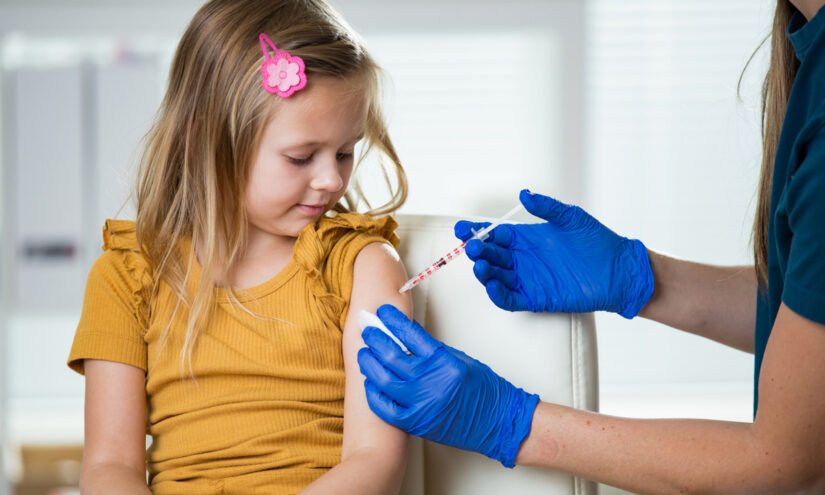Reflecting on the tenets that shape our educational practices is fundamental for …
Increase in Parents Opting their Children Out of School Vaccinations Using Religious Exemption
Jennifer Livingstone

As the start of the school year approaches in a few weeks, many parents of kindergartners are busy ensuring that their children receive the necessary vaccinations before heading off to school.
However, not all parents are following suit. In the past decade, an increasing number of parents have chosen to opt their children out of vaccination requirements using nonmedical religious exemptions, particularly in the aftermath of the COVID-19 pandemic.
While the percentage of children with religious exemptions in incoming kindergarten classes typically remains low, usually not exceeding a couple of percent, the cumulative total over the years has exceeded 10,000 kindergartners attending schools without vaccination records since 2002, based on historical data from the Maryland Department of Health.
The recent rise in religious exemptions may signify a growing trend of vaccine hesitancy among families, noted Daniel Salmon, a professor and director of the Institute for Vaccine Safety at Johns Hopkins Bloomberg School of Public Health.
“There has been an uptick post-COVID,” Salmon stated. “The COVID situation exacerbated misinformation and polarization surrounding vaccinations as a highly politicized topic, which is unhelpful.”
Under Maryland law, children must receive a specified set of vaccinations upon entering kindergarten to safeguard themselves and their peers against communicable diseases like measles, polio, and chickenpox. Exemptions are permitted for medical reasons or due to religious restrictions.
Obtaining a religious exemption in Maryland is a straightforward process. Parents simply need to sign a form declaring: “Because of my bona fide religious beliefs and practices, I object to any vaccine(s) being given to my child.”
Elizabeth Elliott, president of the Maryland Association of School Health Nurses, emphasized the importance of vaccinations while acknowledging the necessity for exemptions.
“Herd immunity is crucial for those within a school community who are unable to be vaccinated for medical reasons,” Elliott explained. “It is our responsibility to vaccinate ourselves and our children to protect those who cannot receive the vaccine due to safety concerns.”
However, tracking vaccine hesitancy proves challenging, with various factors influencing why some families opt not to vaccinate their children, according to Salmon.
“Determining vaccine hesitancy based on data is complex, and the best indicator we have is the proportion of children entering school with nonmedical exemptions,” Salmon elaborated.
Starting from the 2002-2003 school year, where 0.2% of kindergartners obtained a religious exemption, approximately 126 children out of around 63,000 kindergartners that year were not vaccinated.
Over the following years, the rate steadily climbed, with about 0.6% of children receiving religious exemptions in 2012-2013, equating to approximately 419 unvaccinated kids.
In the 2019-2020 academic year, religious exemptions peaked at 2.7%, with 1,641 kindergartners opting out of vaccination requirements. This surge coincided with the onset of the COVID-19 pandemic before the spike in cases in the United States.
Since the 2021-2022 school year, at least 1% of Maryland kindergartners had a medical exemption, totaling a few hundred children annually.
Despite the uptick in percentages and numbers, Salmon believes the figures do not warrant major concern.
“The absolute numbers are relatively small, even though there has been a significant percentage increase,” Salmon expressed.
He also pointed out that looking at a state average does not provide a comprehensive picture of vaccine hesitancy.
“The geographic and social clustering of exemptions can skew the state average, making it misleading,” Salmon highlighted.
In the previous school year, rural counties in Maryland exhibited higher concentrations of religious exemptions. Worcester (4.21%), Cecil (3.75%), and even Baltimore City (2.05%) recorded elevated rates of religious exemptions among kindergartners.
Maryland falls below the national average for religious exemptions, as outlined in data from the Centers for Disease Control and Prevention (CDC). In the 2022-2023 academic year, the national nonmedical exemption average for kindergartners stood at 2.8%, while Maryland recorded 1.4% for that year.
Salmon identified numerous post-pandemic factors contributing to more parents opting for vaccination exemptions.
“There is no single explanation. It involves a combination of factors such as lack of awareness about diseases, safety concerns regarding vaccines fueled by misinformation, and disinformation,” Salmon elaborated. “We need to enhance communication with parents, listen to their apprehensions, and address them using the latest scientific knowledge.”
Elliott added that additional underlying reasons prompt some families to seek religious waivers.
“I frequently encounter families choosing the religious objection due to challenges in accessing vaccines for their children. It’s not uncommon to hear, ‘I couldn’t make it to the clinic,’ prompting them to sign the religious waiver,” she observed, noting a growing trend in middle schools.
Elliott concurred with Salmon on the importance of approaching vaccine-hesitant families with understanding and respect. As a school nurse, she views it as her duty to educate families on the significance of vaccines for health and safety in a school environment.
“We are responsible for reviewing records, ensuring compliance, and engaging families in polite, respectful conversations to inform them about the state’s immunization requirement,” Elliott concluded.


